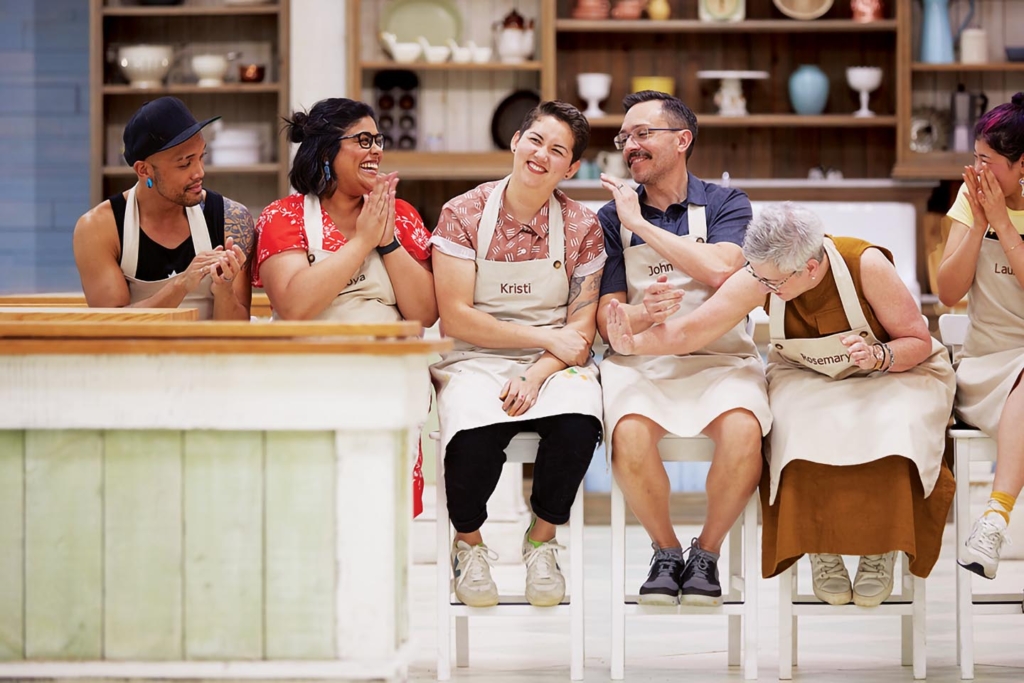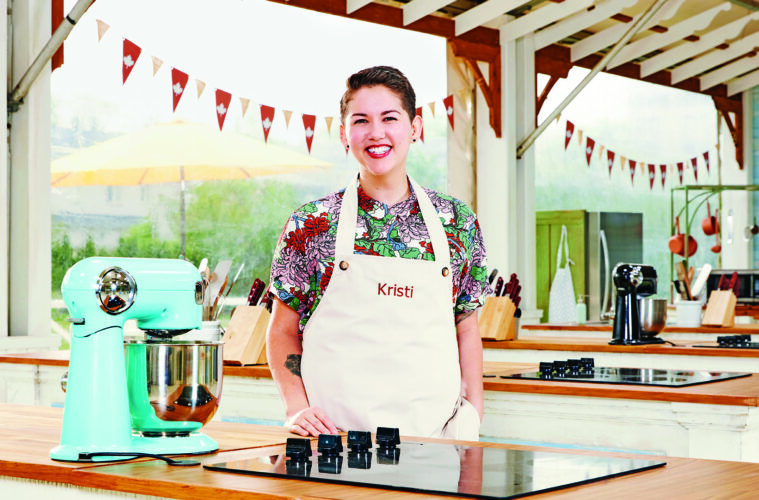Kristi Carey’s Instagram posts featuring delectable desserts prompted a friend to send her an application for the TV bake-off, and she ended up in the semifinals.
On your marks. Get set. Bake!
It was time for the “showstopper challenge,” wrapping up bread week on season six of The Great Canadian Baking Show. This final test required contestants to create a work of art out of bread.
Kristi Carey ’15 decided to replicate a graffitied alleyway: One wall boasted the words “KC bakes,” and robots lined the other. She made those pieces from an allspice Jamaican hard dough; they were supported by a base of bannock (a type of quick bread) with raisins, which Carey painted to look like a street.
“A lot of times, when you think of art, you think of formal, paid-to-access spaces, and I think community art is just as, or more, important,” she told the judges. They called the effort “a perfect bake” and “very clever.”
Earlier in the episode, for the flatbread challenge, Carey used her mother-in-law’s recipe for South Indian paratha, which she filled with her mother’s Sichuan-style ground pork.
These achievements, as well as a perfect Swedish tea ring, earned Carey the episode’s “star baker” title — as well as “the beast with the yeast,” the co-host declared.
“I think I did show more of myself this week, and I think it worked out,” she told the camera.
Her handiwork in those first and last challenges do provide insight into the ingredients composing Kristi Carey.

“For graffiti alley, I did all non-European breads to showcase histories of resistance against colonization and imperialism, as well as a nod to Indigenous resistance with the bannock,” she says. “I would describe my baking as really intentional, which is something I learned the power of at Colgate.” Carey double majored in educational studies and peace and conflict studies before earning her master’s in gender, race, sexuality, and social justice at the University of British Columbia. Today she’s a grant writer in Toronto.
“At Colgate I learned the importance of community activism and how critical it is to elevate stories from minoritized communities. My education informs the way I view the world and my part in it, and baking is one small part of that.”
Carey, like many others during the start of the pandemic, discovered baking. She taught herself by watching YouTube videos and reading. “When I am figuring out how to do something, I over-research it to the point of no return,” she jokes.
The first dessert she made was mango pie — her wife’s favorite. That initial attempt “didn’t go well,” but Carey perfected the tart after a few more tries. Her Instagram posts plotting her journey prompted a friend to send Carey the application link for the show, which is an adaptation of the British version.
After months of tryouts and waiting, Carey got the call: She would be one of 10 contestants, who had five weeks to practice their recipes in advance of the filming, starting May 2022.
The participants are encouraged to put their own spin on the weekly challenges. Carey’s cooking often draws from her Chinese heritage and her wife’s South Indian background, “trying to bring together flavors we both love and crave into ways we couldn’t find in a neighborhood bakery. [I] use as many of the exciting flavors and textures from our backgrounds to create something new.”
Carey baked her way to the semifinals, “fancy dessert week.” But a gelatin art cake replicating a “fishbowl apartment” would lead to her demise. The concept was based on her and her wife’s first apartment. Comparing it to a fishbowl, Carey explains: “We had floor-to-ceiling windows, which meant that everybody could see everything.”
She translated this into a multilayered Thai basil and lime cake topped by a clear layer of almond jelly, which held mini-furniture that Carey constructed from modeling chocolate.
That day, it was 111 degrees Fahrenheit under the tent where the show is filmed — dicey conditions for a four-layer cake held together by goat cheese mousse — and the dessert started cracking.
“There is nothing to be upset about, there is so much to be proud of here,” one judge said, noting Carey’s distress. Still, only three contestants could continue, and Carey was eliminated. The judges said it was one of the hardest decisions they ever had to make.
It was an emotional ending, but the 12-hour days on set as well as the weeks away from her wife left Carey feeling ready to return home.
Meanwhile, her former professors (including fellow Canadian Susan Thomson) and classmates were rooting her on from their living rooms. “[People] I’ve kept in touch with over the years have been amazingly supportive,” Carey says, “even if they were a bit surprised, given that, when I was at Colgate I could barely boil water.”
She came away from the experience with enhanced culinary ingenuity and a network of friends from the show whom she can message any time “I’m trying an idea and things aren’t going my way.”

